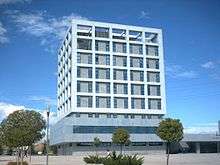King Juan Carlos University
|
Universidad Rey Juan Carlos | |
 | |
| Motto |
Non nova, sed nove ("Not new, but in a new way") |
|---|---|
| Type | Public |
| Established | 8 July 1996, |
| Rector | Javier Ramos |
Administrative staff | 1,904 |
| Students | 45,458 (2017)[1] |
| Location | Madrid, Community of Madrid, Spain |
| Campus | Móstoles, Alcorcón, Fuenlabrada, Vicálvaro and Madrid |
| Colors | |
| Nickname | URJC |
| Affiliations | CRUE |
| Website |
www |
King Juan Carlos University (Spanish: Universidad Rey Juan Carlos, URJC) is a Spanish public research university located in the southern area of the Community of Madrid (Spain), with four campuses at Móstoles, Alcorcón, Vicálvaro and Fuenlabrada.
It is named after former king Juan Carlos I of Spain and has the Latin motto Non nova, sed nove ("Not new things, but in a new way"). It was established in 1996 by the government of the Community of Madrid.
With 37,939 students, it is the second-biggest public university in the Community of Madrid, behind the historical Universidad Complutense.[2] URJC is one of eight universities in the Community of Madrid, and it is the second-newest university in the community.
In March 2018, the University suffered a major loss of prestige when newspapers identified multiple irregularities in the award by its Institute of Administrative Law of a master's title to President of the Community of Madrid Cristina Cifuentes,[3] and that her sister was irregularly hired as a professor.[4] Shortly thereafter, another prominent politician of the Partido Popular who would later become its president, Pablo Casado, was found to also have obtained the same master's degree from the university without ever attending any class, taking any test, or turning in any final dissertation.[5] The judicial investigation of their titles identified a further three cases of degrees granted without any paper track to students with close connections to the People's Party.[6] On 10 September 2018, newspapers uncovered evidence of further irregularities in the award by the same Institute of Administrative Law of a master's degree to Socialist Party's Minister of Health, Consumption and Social Welfare Carmen Montón. As a result of the controversy, she announced her resignation the following day.[7][8] The university eventually closed down its beleaguered Institute of Administrative Law, after a prosecutor found out that its former director had operated it as essentially his private business. [9]
This scandal followed the 2017 forced resignation of the president of the university, Fernando Suárez Bilbao, for heavy plagiarism in his PhD thesis.[10][11] In May 2018, a private teaching company that is very closely associated with the new president of the university, Javier Ramos, was additionally found to be using a €1 million technical building of the university without paying any rent.[12][13] Furthermore, that building was designed for the university by an architect who worked for many months without a contract and outside any legal framework.[14]
Studies
King Juan Carlos University offers a range of degrees, all adapted to the European Higher Education Area. This includes 64 undergraduate degrees, 44 dual degrees, 6 English-medium degrees, 6 university degrees on-line, 18 diplomas, and 8 engineering degrees, as well as a wide range of official master's (81) and doctoral programs involving both degrees and training (34) in health sciences, experimental sciences and technology, communication sciences, and law and social sciences. King Juan Carlos University has four campuses in Madrid, Fuenlabrada, Móstoles and Vicálvaro, as well as a foundation whose headquarters are on Madrid’s Plaza de Manuel Becerra.

Campus
The URJC is divided into four campuses. Each campus is composed of one or more schools:
- Móstoles Campus is, since 1998, the headquarters of the School of Experimental Sciences and Technology (ESCET) and since 2007 the School of Computer Engineering (ETSII). It also houses the University Senate and the office of the President (Rector).
- Alcorcón Campus ouses the Faculty of Health Sciences since 1997 and the University Hospital URJC.
- Vicálvaro Campus (Madrid) is the seat of the Faculty of Juridical and Social Sciences (FCJS) since 1998.
- Fuenlabrada Campus houses since 2000, the Faculty of Communication Sciences and School of Tourism, which since November 2009 was renamed the Faculty of Tourism, and since 2005 the School of Telecommunications Engineering (ETSIT).
Each school or college is governed by a Dean or School Director, and is divided into academic departments.
Affiliated centres:
- Institute of Commercial Management and Marketing in Somosaguas (Madrid).
- ESERP School (Madrid).
Colleges:
- Higher Institute of Dance Alicia Alonso (Fuenlabrada).
- Institute of Humanities (Vicálvaro).
- Institute of International Legal Studies (Vicálvaro).
- Public Law Institute (Vicálvaro).
University Centres:
- University Language Centre (Vicálvaro), which regularly gives courses in English, French, German, Italian, Chinese and Spanish for foreigners.
- Emile Noël Research and Documentation Centre of the European Union (Vicálvaro).
- Volunteering and Cooperation Centre (Alcorcón).
- University Centre for Applied Social Studies (Vicálvaro).
- Economics Study Centre in Madrid (Vicálvaro).
- Centre for Latin American Studies (Móstoles).
- Centre for the Study of the Olympic Movement (Vicálvaro).
- Centre for Intelligent Information Technologies and Applications (CETINIA).
- Business Incubator (Vicálvaro).
- Legal Office (Vicálvaro).
- Technology Support Centre (Móstoles).
- Centre for Innovation, Technology Transfer and Knowledge (Móstoles).
- Laboratory Network URJC (REDLABU).
- Centre of Research and Teaching, located in the so-called Nuncio's Palace in Aranjuez.
King Juan Carlos University organizes its summer courses in Aranjuez.
Academic programs
Studies include computer science, telecommunications engineering, chemical engineering, environmental science, odontology, medicine, nursing, physiotherapy, audiovisual communication, telecommunications, tourism, journalism, law, economics, business administration and management, sociology, history, accounting and finance, marketing, food science and technology, biology, psychology, preschool education, international relations, visual arts and dance, and criminology, among others.
Gallery
 URJC Rectorate Building
URJC Rectorate Building URJC Building located in Manuel Becerra Square in Madrid
URJC Building located in Manuel Becerra Square in Madrid 1st Department Building, Móstoles Campus
1st Department Building, Móstoles Campus 2nd Department Building, Móstoles Campus
2nd Department Building, Móstoles Campus 2nd Classroom Building (right) and 2nd Laboratory Building (left), Móstoles Campus
2nd Classroom Building (right) and 2nd Laboratory Building (left), Móstoles Campus
Honorary doctorates
In 2007 Juan Velarde Fuertes, Iñaki Gabilondo, Luis del Olmo and Antonio Mingote were awarded honorary doctorates from King Juan Carlos University. In January 2008, Bernardo Kliksberg became the first foreigner to receive an honorary doctorate degree from the university along with Jaime Gil Aluja, José Antonio Pastor Ridruejo and Fernando Sánchez Calero. In 2011, honorary doctorates were awarded to Harald zur Hausen, Ramón Tamames and Peter Waldmann.[15]
In 2014 James A. Yorke, distinguished University Professor of Mathematics and Physics at the University of Maryland and recipient of the 2003 Japan Prize in Science and Technology, was awarded an honorary doctorate from King Juan Carlos University.[16] Prof. Yorke is known worldwide for the definition of the mathematical term "chaos" in 1975. Rodrigo Rato, former Managing Director of the IMF and Spanish Deputy Prime Minister, previously held an honorary doctorate from King Juan Carlos University, which was not immediately canceled when he was later sentenced to 4½ years' imprisonment for bank fraud in his role as chairman of bank Bankia.[17]
References
- ↑ "Anuario Estadistico de la Comunidad de Madrid. Educacion, formacion e investigacion". Retrieved 23 July 2015.
- ↑ "URJC - Yoyster.com". Archived from the original on 18 May 2015. Retrieved 23 July 2015.
- ↑ "Cristina Cifuentes obtuvo su título de máster en una universidad pública con notas falsificadas". eldiario.es (in Spanish). 21 March 2018. Retrieved 29 March 2018.
- ↑ La misma universidad que regaló un máster a Cifuentes contrató como profesora a su hermana de manera ilegal
- ↑ Dos alumnos del máster de Casado le contradicen: era obligatorio ir a clase y hacer trabajo final
- ↑
- ↑ "Las inverosímiles explicaciones de la ministra sobre su máster", Eldiario.es, 10 September 2018
- ↑ Carmen Montón dimite como ministra por su máster irregular (in Spanish)
- ↑ La universidad disuelve el instituto del ‘caso máster’ (in Spanish)
- ↑ El Mundo.
- ↑ El País.
- ↑ El País.
- ↑ El País.
- ↑ El País.
- ↑ "Prof. Dr. Peter Waldmann (emeritus)". Retrieved 23 July 2015.
- ↑ "Unidad de Información Científica URJC James Yorke investido doctor 'honoris causa' por la URJC -". Retrieved 23 July 2015.
- ↑ https://verne.elpais.com/verne/2018/04/10/articulo/1523354694_298467.html. Retrieved 11 April 2018. Missing or empty
|title=(help)